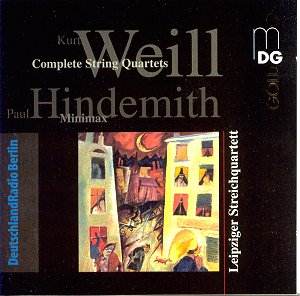This music was a closed book until MD&G, Deutschland
Radio and the Leipziger Streichquartett opened its pages.
What to expect of Weill and the string quartet? I expected
something more caustic and sardonic than the First Quartet. But then
I looked again at the date of the work. It is an early effort. Certainly
the 1919 work is elegant, with Schubertian lyric orientation, clarity
and the trappings of cosmopolitan savoir-faire. This is not the acrid
Weill but one who unwittingly shows a greater empathy with the émigré
Hollywood songs of Hanns Eisler (as glowingly recorded by Matthias Goerne
on Decca) and of Othmar Schoeck. This is Weill finding his feet and
writing within a tradition he was later to so infiltrate with 'alien'
elements that it emerged just as lyrical but with a militant disillusioned
edginess. Certainly his gift for the singable line can be discerned
here. You should approach this quartet as if it were a pared down Reger
or more accurately as if it were Schoeck or Weigl. The work gives us
perhaps some insight into the language employed in his lost tone poem
on Rainer Maria Rilke's Die Weise von Liebe und Tod des Cornets Christoph
Rilke. While showing my preoccupation with stylistic parallels I
must also emphasise what a pleasurable work this is and the Langsam
(III) is every bit as good as Reger's andantes. Only in the last movement
does convention wear the listener's attention a little thin.
The three movement Op. 8 quartet was written under
the tutelage of Busoni and steps well back from the sort of German romanticism
to be found in Pfitzner and Schoeck. In its place the Junge Klassizität
substitutes a more objective and emotionally restrained style here cut
with a modicum of Schoenbergian expressionism - this was after all the
1920s. Flighty, cheery and delicately cool, it is largely unTeutonic
although the Choralphantasie 'round' finale (at 10.44 twice as long
as the other two movements put together) does tread with a completely
Bachian gravity. This retreat into complexity compares unfavourably
with the air and light of the first two movements. After the first four
or so minutes Weill takes us back to music more consonant with the predecessor
movements although he soon returns to the pedestrian patterning of the
start of the movement. Interesting, at 4.46, how the little chugging
march figure looks to the two symphonies. Lovely playing by the way.
As an illustration listen to the whispered chittering at 7.29 in which
Weill is unknowingly in touch with the Wicca music in Peter Warlock's
The Curlew.
Hindemith's Minimax is a suite of six humorous
movements encompassing the absurd pride of the German military march
(complete with sliding wrong notes), a take-off of Suppé's Poet
and Peasant, an intermezzo in which instrumentalists take the role
of two distant trumpets, a concert waltz with an ever so slightly sad
introduction, a squeakily high dance with a prominent part for the two
violins and a pawky march called Alte Karbonaden (a reference
to barbecued spareribs) guying Karl Teike's march Alte Kameraden.
This is music of light though perhaps time-worn if not time-expired
humour. It is an extremely skilled and entertaining cassation rather
than a serenade. Think of a sort of modernised Viennese cross between
a chamber version of the Toy Symphony, Eine Kleine Nachtmusik
and a Malcolm Arnold divertimento. Charming stuff and full of in-jokes
between the composer and his beloved Amar Quartet.
Thorough documentation that complements a pleasurable
and surprising listening experience.
Rob Barnett


